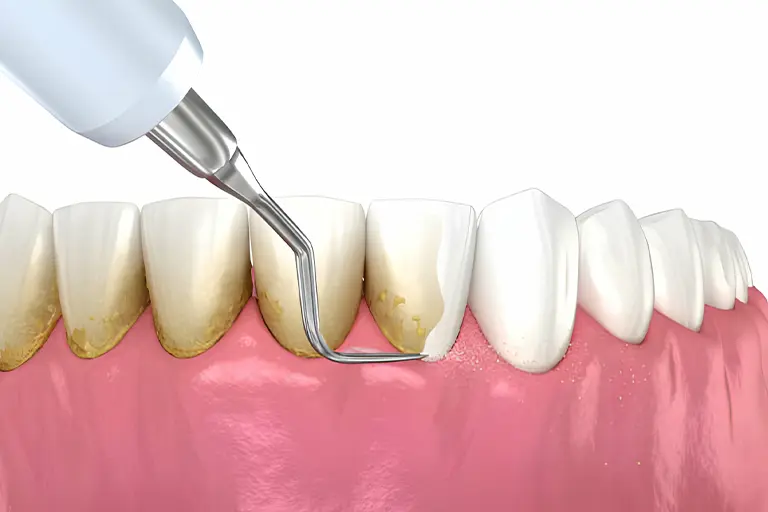Dental and oral hygiene in our life can prevent some future treatments on our teeth like tooth scaling. There are some wrong ways of thinking about scaling and in this article, we will cover this procedure completely.
Before going through scaling, learn more about plaque on teeth
This plaque sounds familiar, doesn’t it? Plaque is thin sticky layers that build up on teeth daily through our saliva and after eating and drinking. Plaque contains saliva, good and bad bacteria, food debris, and some minerals.
Normally, it’s always around and we eliminate it every time by brushing our teeth, flossing, and using mouthwash. If you forget to brush your teeth for a long time, the buildup of plaque on your teeth becomes hard. Here, the option for elimination is tooth scaling.
What is tooth scaling?
Scaling is a dental treatment to remove tartar (that hard plaque) on teeth. The removal process is done by the dentist and the later to remove it, the harder it becomes. If not removed, gums become inflamed and deteriorate, and gum disease results.

How tooth scaling is carried out?
As we said, the goal of scaling is eliminating hard plaque on the surface of teeth along the gum line. There are 2 ways to do this process. The first way, some manual instruments like a scaler or curette are used to remove the scale from the surface of teeth.
In the second way, ultrasonic instruments are used instead of manual ones. These instruments act like vibrators and have a narrow metal point to do the scaling along with cold water. The instruments are very practical in removing the scale.
What does happen after scaling?
After scaling, dentists may need to use various instruments to polish the teeth to reduce the chance of scal formation.
Also, fluoride treatment is another follow-up treatment that is required for some patients to strengthen enamel after the process of scaling.
Is tooth scaling painful?
It might relatively cause some discomfort, which can’t be called pain. Depending on the amount of scale on the teeth, the process can cause some slight bleeding in the gum or some little pain. Overall, the bleeding and feeling of pain is not that much that you might get worried about.
Does scaling help in whitening teeth?
It is not true to say tooth scaling is directly involved in whitening the teeth. Tooth scaling is mainly for the purpose of scale removal on teeth and gum lines.
Teeth Whitening is done through bleaching, which is different from scaling. Bleaching involves color changes of teeth and the treatment process to eliminate the discoloration on teeth and not the scale.
3 myths about teeth scaling
Imagining some fears and strange beliefs about scaling as an action that might harm teeth and gums should not occupy your mind and it is not true to think like that.
Here we mention just some of those wrong beliefs.
1. It is said that tooth scaling causes teeth to become loose
There is no evidence to say scaling is responsible for loose teeth or malpositioned teeth. Just the opposite, the worst scenario is not removing plaque or tartar, which may lead to periodontitis (gum infection) and finally to the bone tissues and loosening of the tooth.
With these in mind, you need to think about scaling as a preventive way to help teeth stay fixed and stable by preventing tartar and plaque from accumulating on teeth.
2. They say it leads to enamel erosion
There is this belief that scaling itself causes the scaling process to be done. The point is scaling is not causing enamel erosion.
Scaling process whether by manual instruments or ultrasonic ways is not leaving any marks or etching on the enamel surface. The main operation is just scale removal and nothing else. Teeth sensitivity is just temporary and will pass soon.
3. Another wrong belief circulating around: teeth sensitivity is the result of scaling
It is normal if you feel gum or dental sensitivity. This sensitivity is the result of that previously your teeth and gum lines had scale coating. Therefore, by removing the scale, you may experience a little bleeding in the gum area and sensitivity is normal and temporary.
The developed sensitivity is greater if the scale coating is thicker and if it is just a slight buildup, the sensitivity is nothing to worry about. You may experience sensitivity for 24 to 48 hours after the completion of the scaling process.
